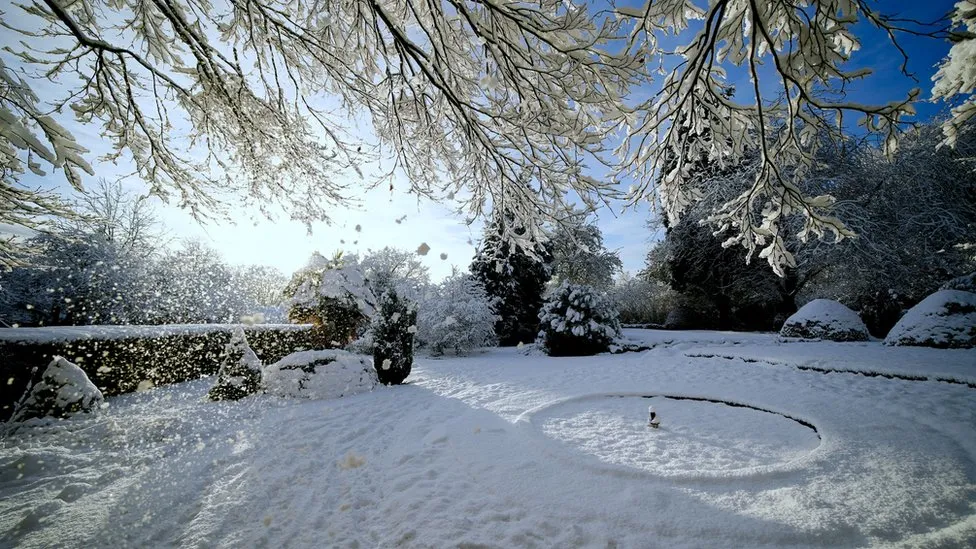Temperatures fell to -13C overnight as waves of Arctic air continue to move across the UK.
Forecasters had said Tuesday night could prove to be the coldest January night for 14 years. Bitter conditions and significant snowfall have already forced schools to shut in Scotland and northern England, and sparked travel disruption.
Yellow warnings for ice and snow are in force in all four UK nations, before possible stormy weather this weekend. By the end of Friday, more than 40cm of snow may be seen on high ground in north-west Scotland, as wintry weather continues, the Met Office has forecast.
Snow, sleet and rain are expected to continue blanketing northern parts of the UK, though there will be some sunshine. Heavy frosts and freezing conditions are likely across virtually the entire country, with experts warning of treacherous pavements and roads.
The low of -13C was seen in provisional recordings by the Met Office in the region of Glen Ogle, central Scotland. The forecaster said on Tuesday that overnight temperatures in snow-covered parts of Scotland could fall as low as -15C, which would make it the coldest January night since 2010.
The lowest temperature so far this winter was -12.5C, in Altnaharra, in early December. In January 2010, -22.3C was recorded in the same Scottish Highlands hamlet. Temperatures in most of Scotland are forecast to remain at freezing or lower throughout the day on Wednesday.
The UK Health Security Agency issued an amber cold weather warning for England this week, meaning the NHS is expected to come under extra pressure and elderly people may be more at risk.

Icy winds blowing in from the Arctic this week have seen temperatures fall 5C to 6C below the average for this time of year. The Met Office has issued three yellow weather warnings for Wednesday. They are:
- A snow and ice warning for Northern Ireland and northern Scotland until 23:59 GMT on Wednesday
- An ice warning for southern Scotland until 12:00 GMT on Wednesday
- A snow and ice warning for northern England and northern Wales until 12:00 GMT on Wednesday
On Thursday, two more yellow snow and ice warnings cover much of the same regions, excluding some eastern areas of England and Scotland and southern parts of Northern Ireland. The UK is braced for sub-zero temperatures until the weekend, with Tuesday seeing more than 100 school closures in Scotland and dozens in Merseyside.
All schools in Shetland were closed, with more than 50 shut in the Highlands and some sites in Aberdeenshire also affected, though some schools there have reopened.
Northern and eastern parts of Scotland saw the “bulk of the snow” on Monday, with 15cm on the ground at Aberdeen Airport. Met Office Chief Meteorologist Andy Page has warned of drifting or blizzard conditions.
South of the border, Liverpool Council said conditions had a “widespread impact” on Tuesday, with staff deployed to clear snow around schools, hospitals and transport hubs. On the trains, National Rail has warned there could be disruption across the network throughout the week.
The cold weather also affected Tuesday's football schedule with National League matches at Oldham, Halifax, Southend, Woking and York called off, as well as Mansfield versus Forest Green Rovers in League Two.
The cold spell has resulted in automatic £25 payments for households in receipt of certain benefits being triggered in more than 220 postcodes where temperatures are expected to be below zero for a full week. The assistance with heating costs for eligible households also applies in some parts of Wales and northern and eastern England.
Looking ahead to Friday and beyond, BBC Weather's Chris Fawkes said: “Snow in Scotland will start to become confined to hills as temperatures start to rise by an odd degree.
“For those that don't like the cold weather, there will be a big change this weekend as the weather turns much milder.” He continued: “This change will be accompanied by very strong, possibly disruptive winds and spells of heavy rain will also return.
“The flooding we had at the start of the year may seem a long time ago for many, but with the ground remaining saturated we'll have to be watchful of the risk of flooding that any heavy rain may bring.” As of 05:00 GMT on Wednesday, there were also 20 flood warnings – meaning flooding is likely – and 65 flood alerts – meaning flooding is possible – in place in England.
— CutC by bbc.com


